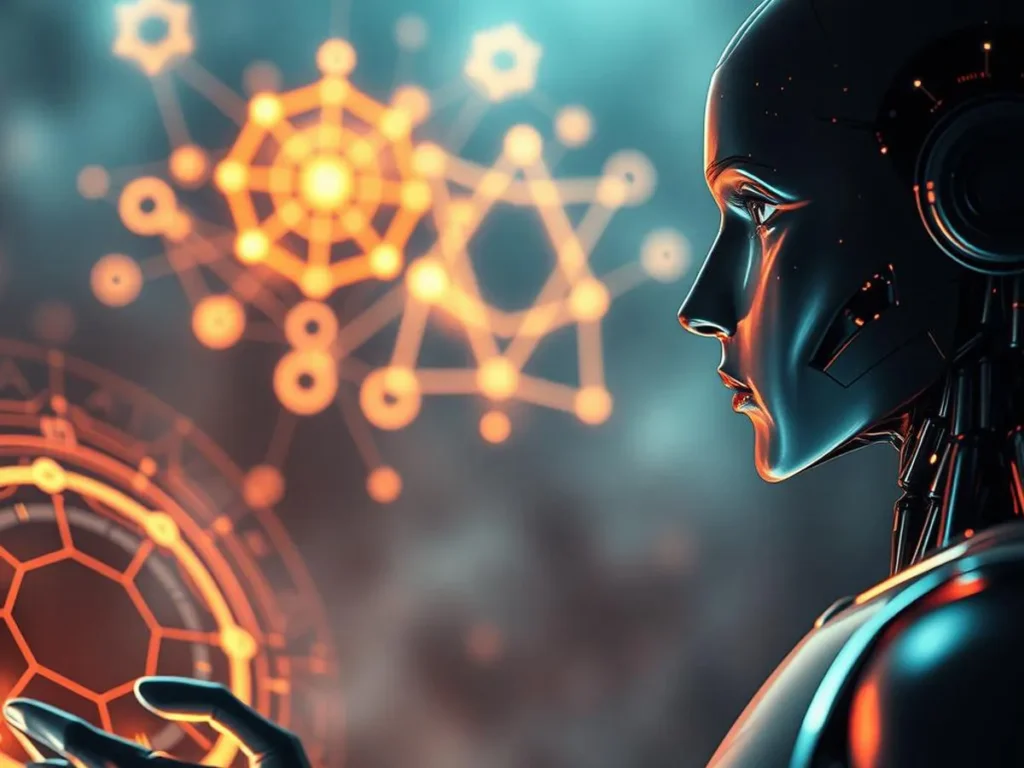A recent study showed that over 70% of organizations are using artificial intelligence. This raises big questions about the ethics of AI development and use.
The fast growth of AI in different fields has led to heated discussions. People are worried about artificial intelligence ethics like bias, privacy, and jobs being lost.

Table of Contents
As we head into 2025, it’s more important than ever to understand the ethics of AI. This article will dive into the main debates and concerns about AI’s future. We’ll look at the rules and how AI affects society.
The Current State of AI Ethics in 2025
The state of AI ethics in 2025 is complex. AI is everywhere, and its ethics are a big deal. We must think about its impact on society.
Evolution of AI Capabilities Since 2023
AI has grown a lot since 2023. It can now do things humans used to do. This includes learning, understanding language, and seeing the world.
Breakthrough Technologies Reshaping the Landscape
New tech like explainable AI and edge AI has changed AI. These advancements have made AI better but also raised questions.
Unexpected Ethical Challenges from Recent Advancements
New AI tech has brought up big ethical issues. Jobs might be lost, privacy could be at risk, and AI could be used badly. We need to understand AI’s ethics well.
Major Ethical Frameworks Emerging
Many ethical guidelines for AI have come up. They stress the need for AI to be open, accountable, and fair.
Utilitarian vs. Deontological Approaches to AI Ethics
The debate on AI ethics is ongoing. Some say we should focus on AI’s benefits. Others say we must follow moral rules.
Non-Western Ethical Perspectives Gaining Influence
Views from non-Western cultures are becoming more important in AI ethics. They show us AI’s impact on different cultures and societies. This calls for a more diverse AI ethics.
| Ethical Framework | Key Principles | Implications for AI |
|---|---|---|
| Utilitarian | Maximize overall benefit | Focus on AI’s potential to improve societal welfare |
| Deontological | Adhere to moral rules and duties | Emphasize the importance of transparency and accountability in AI |
| Non-Western | Cultural and societal context | Highlight the need for diverse and inclusive AI ethics approaches |
Regulatory Landscape for AI in 2025
In 2025, the AI world is seeing a mix of global and local rules. This shows how complex AI ethics have become.
Global AI Governance Initiatives
Many global efforts are underway to tackle AI regulation challenges. International groups are working to set common AI ethics guidelines. They want to help with ethical AI development worldwide.
US Regulatory Approaches
The United States is taking a multi-faceted approach to AI rules. Both the federal and state levels are playing key roles.
Federal vs. State-Level AI Regulations
Federal efforts aim to create broad AI regulations. This creates a varied landscape.
International Cooperation and Conflicts
As AI rules spread worldwide, working together becomes crucial. Yet, different country approaches can cause conflicts.
The Ethics of AI: Core Principles Under Debate
In the world of AI ethics, several key principles are being debated. These debates shape the future of AI. The main issues include transparency, accountability, and ethical dilemmas in AI.
Transparency vs. Proprietary Algorithms
The debate on transparency in AI revolves around openness. It’s about how AI systems are designed and function. On the other hand, companies want to protect their proprietary algorithms to stay competitive.
The Right to Explanation Movement
The right-to-explanation movement is growing. It says people should understand the reasoning behind AI decisions that affect them. This movement is important as AI plays a bigger role in our lives.
Corporate Resistance to Full Disclosure
Companies often resist full disclosure of their AI algorithms. They worry about protecting their intellectual property and staying ahead of competitors. This shows the ethical dilemmas in AI, where transparency and business interests clash.
Accountability Frameworks for AI Systems
As AI systems become more independent, accountability is a big issue. Creating frameworks to hold AI systems and their developers accountable is a big challenge.
Legal Liability Models for AI Decisions
One way to address accountability is through legal liability models for AI decisions. This could mean adapting existing laws or creating new ones for AI.
Technical Approaches to Algorithmic Accountability
There are also technical approaches to ensure accountability. These include auditing AI algorithms and explaining their decisions.
| Principle | Transparency | Accountability |
|---|---|---|
| Key Issue | The balance between openness and protecting proprietary information | Determining liability for AI decisions |
| Stakeholders | Developers, Users, Regulators | Developers, Users, Legal Entities |
| Proposed Solutions | Right to Explanation, Auditing Mechanisms | Legal Liability Models, Technical Accountability Measures |
Algorithmic Bias and Fairness Challenges
AI systems are everywhere now, and we face a big challenge: algorithmic bias. This bias affects fairness and equity. We need an AI ethics framework to tackle these biases and make AI fair.

Recent Cases of AI Discrimination
In recent years, AI has shown bias in many areas like hiring, law enforcement, and finance. For example, a study found an AI hiring tool was unfair to women. This shows we must focus on ethical considerations in artificial intelligence to avoid discrimination.
Technical Solutions to Bias
To fight algorithmic bias, we have technical fixes. These include fairness methods used at different AI development stages.
Pre-processing vs. In-processing Fairness Techniques
Pre-processing changes data before AI training. In-processing tweaks the algorithm during training to avoid bias. Each method has its own benefits and drawbacks, depending on the task and data.
Post-deployment Monitoring Systems
It’s key to watch AI systems after they’re live for bias.
Societal Implications of Biased Systems
These frameworks help create fair and unbiased AI for everyone.
Privacy Concerns in the Age of Advanced AI
Advanced AI has made privacy a big worry. AI needs lots of personal data to work well.
Data Collection Ethics
Collecting data for AI is a tricky issue. AI uses huge datasets, which can include very personal info. It’s key to make sure this data is gathered right.
Informed Consent in the Era of Ambient Intelligence
Getting people’s consent is hard when AI and ambient tech mix. Being clear about data collection is key to solving this problem.
Data Minimization Principles
This can help protect privacy with AI. Reducing data collection helps keep privacy safe.
Right to be Forgotten in AI Systems
As AI affects more parts of our lives, it’s important to let people control their data.
Technical Challenges of Data Deletion
Deleting data from AI systems is hard. AI uses complex algorithms and big datasets, making it tough to erase certain data. Creating good ways to delete data is very important.
Balancing Historical Data Needs with Privacy Rights
Finding this balance is key for AI to be developed ethically.
AI Autonomy and Decision-Making Authority
AI systems are getting smarter, leading to debates about their freedom and decision-making power. The ability of AI to act on its own raises big questions about ethics.
Human-in-the-Loop Requirements
“Human-in-the-loop” means humans must watch and guide AI decisions. This is key to keeping AI ethical and in line with human values.
Critical Domains Requiring Human Oversight
In areas like healthcare and justice, human eyes are needed.
Meaningful Human Control Frameworks
We need frameworks that let humans control AI. These must balance human oversight with AI’s efficiency and growth.
Autonomous Weapons Systems Debates
The creation of AI weapons has sparked worldwide debates. The ethics of AI deciding life and death in war are huge concern.
Current International Agreements
International talks aim to set rules for AI weapons. Diplomatic efforts aim to stop the spread of deadly AI weapons.
Ethical Arguments For and Against Lethal Autonomous Weapons
Some say AI weapons could lower human losses and make war more targeted. But others worry about uncontrolled escalation and lack of accountability.
| Aspect | Proponents’ View | Critics’ View |
|---|---|---|
| Human Casualties | Reduced through precision | Increased risk of escalation |
| Accountability | Clear chain of command | Lack of human oversight |
Medical and Legal Decision-making by AI
AI is being used more in medicine and law, raising questions about its role. While AI can process lots of data, human expertise is still key for making complex decisions.

Economic Impact and Labor Displacement
AI’s effect on the economy is complex, with job loss being a big worry in 2025. As AI gets better and more common, it’s changing many industries and job markets.
Industries Most Affected by AI in 2025
AI in 2025 has changed many industries, with some feeling it more than others. The biggest changes are in manufacturing, customer service, and transportation.
White-Collar Automation Trends
AI is now doing jobs that used to be for people, like analyzing data and making decisions. This trend will keep going, with AI ethics guidelines helping make sure it’s done right.
New Job Categories Created by AI
AI not only takes jobs but also creates new ones, like AI developers and data scientists. These jobs need special skills, showing the need for continuous education and retraining. Creating these jobs is a big part of ethical AI development.
Ethical Approaches to AI-Driven Unemployment
Dealing with AI-driven job loss needs a mix of quick help and long-term plans. This includes helping those who lose their jobs and training the workforce for the future.
Universal Basic Income Experiments
Some places are trying Universal Basic Income (UBI) to fight AI job loss. UBI gives everyone a basic income, no matter if they have a job or not.
Retraining Programs and Their Effectiveness
Retraining programs are key for workers to keep up with the changing job scene. These programs teach skills that work well with AI, like thinking critically and being creative.
Cultural and Global Perspectives on AI Ethics
AI is changing many parts of our lives. This means we need to think about its ethics from different cultures and around the world. How we make and use AI is shaped by many things, like cultural values and rules.
Eastern vs. Western Approaches to AI Governance
AI is governed differently in Eastern and Western cultures. This shows big differences in what societies value and what they think is right. Eastern cultures often focus on the good of the group, while Western societies put more emphasis on individual rights.
Collectivist vs. Individualist Value Systems
In collectivist societies, AI ethics might focus on what’s best for the community. In contrast, individualist cultures might worry more about personal privacy and freedom. It’s important to understand these differences to make AI ethics frameworks that work for everyone.
Religious and Philosophical Influences on AI Ethics
Beliefs from religions and philosophies also shape how we see AI. For example, some views might affect how we think about AI autonomy and its impact on human dignity.
Digital Colonialism Concerns
The world of AI raises worries about digital colonialism. This is when powerful countries or companies use technology and data in ways that might harm or control weaker areas.
Technology Transfer and Ethical Standards
When AI technology is shared across borders, we need to talk about ethical standards. This is to make sure that technology is used fairly and doesn’t harm anyone, and that everyone gets a fair share of the benefits.
Indigenous Knowledge Systems and AI Development
Using indigenous knowledge systems in AI can bring new ideas to the table. It can make the global conversation about AI ethics richer and more diverse.
It’s key to bring together different views from around the world to make a strong AI ethics framework. This framework should meet the needs of people everywhere.
Emerging Technologies and Novel Ethical Dilemmas
New technologies are changing AI, bringing up big ethical questions. As we move into 2025, combining AI with other advanced techs is creating new moral issues.
AI is being mixed with quantum computing, brain-computer interfaces, and synthetic biology. This mix is making things better but also raises big ethical worries. We need to think about how these changes affect society and our values.
Quantum AI Ethics
Quantum AI can solve problems fast, but it makes us wonder about its fairness and openness. We must make sure quantum AI’s benefits don’t come at the cost of ethics.
Brain-Computer Interfaces and Mental Privacy
BCIs are making it hard to tell where humans end and machines start, worrying about our mental privacy. As BCIs get better, we must protect our mental data and use these techs correctly.
Synthetic Biology and AI Integration
AI and synthetic biology together are changing biotech, but they also bring up ethical problems. It’s key to make sure AI in synthetic biology is safe and respects human values.
| Emerging Technology | Ethical Dilemma | Potential Impact |
|---|---|---|
| Quantum AI | Accountability and Transparency | Enhanced problem-solving capabilities |
| Brain-Computer Interfaces | Mental Privacy Concerns | Revolutionized human-machine interaction |
| Synthetic Biology with AI | Misuse and Safety Concerns | Advancements in Biotechnology |
In conclusion, the ethical problems of new techs with AI are complex. We need everyone involved to make sure these advancements help society and stay ethical.
Public Perception and Trust in AI Systems
The way media shows AI affects how people see and trust it. As AI becomes more common in our lives, knowing what builds trust is key. This is important for AI to be widely accepted.
Media Portrayal of AI Ethics
Media has a big part in shaping what people think about AI. Responsible AI practices often get lost in stories about AI failures. News about AI mishaps can make people lose trust. But, stories about AI’s good sides can help people see it in a better light.
It’s important for the media to show a balanced view of AI. This means highlighting both its strengths and weaknesses.
Building Trustworthy AI Systems
To gain trust, developers must focus on the ethics of AI in their work. This means making algorithms clear, protecting data, and being accountable. By doing this, they can make AI systems that are not just good but also reliable.
Teaching the public about AI’s possibilities and limits can also help. This education can make people more informed and trusting of AI.
Conclusion: The Path Forward for Ethical AI
As we explore the future of artificial intelligence ethics in 2025, it’s clear we need a broad strategy. The current AI ethics landscape is filled with debates on transparency, accountability, and bias. These are just a few of the many issues we face.
To tackle these problems, we must follow that focus on human values and well-being. This means creating strong AI ethics frameworks and working together globally.
By combining insights from different fields, we can build AI that’s both smart and responsible. Moving ahead, it’s vital to keep refining AI ethics guidelines. This ensures AI development stays true to human values.


Thanks for sharing. I read many of your blog posts, cool, your blog is very good.
Your point of view caught my eye and was very interesting. Thanks. I have a question for you.